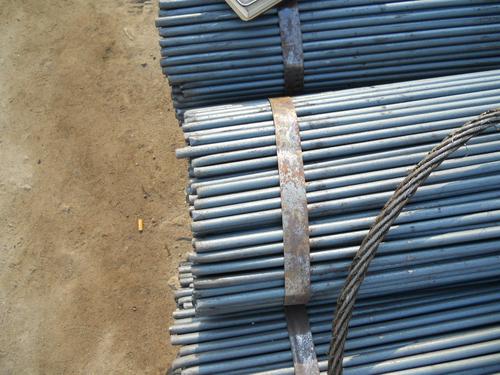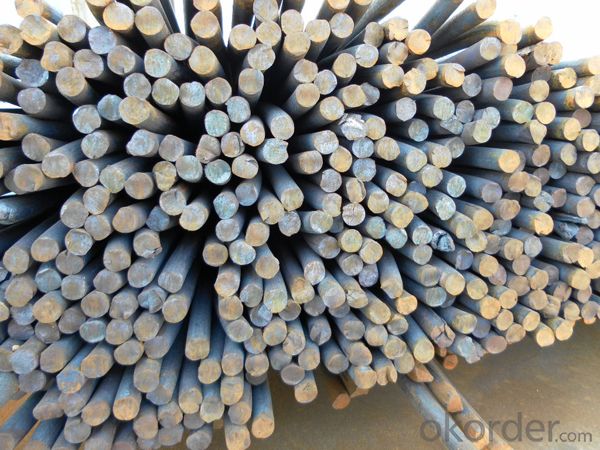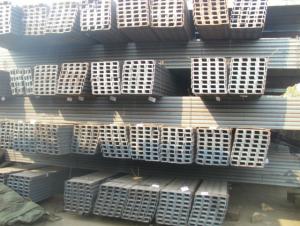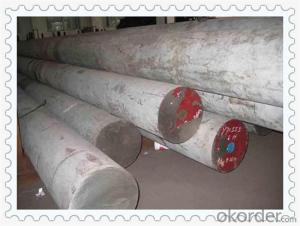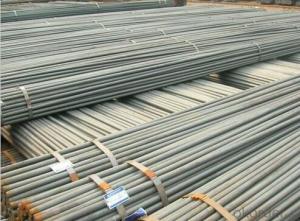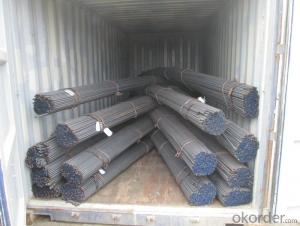GB Q345 Steel Round Bar
- Loading Port:
- China Main Port
- Payment Terms:
- TT OR LC
- Min Order Qty:
- -
- Supply Capability:
- -
OKorder Service Pledge
OKorder Financial Service
You Might Also Like
Specifications of Steel Round Bar:
1. Standard: GB
2. Grade: Q345
3. Invoicing on theoretical weight or actual weight as customer’s request
4. Shape: Round bar, solid bar of steel with circular section
5. Technique: Hot rolled
Size:
| Size (mm) | Section Area (cm2) | Mass (Kg/m) |
| 17 | 226.865 | 1.78 |
| 18 | 254.34 | 2.00 |
Usage and Applications of Hot Rolled Round Bar
1. Hot rolled round bar of 6-25mm, or small round is mostly used for straight bundles supply, and used for steel, bolts and various mechanical parts. While the bigger round bar, or more than 25mm hot rolled bar, is mainly for the manufacture of mechanical parts or for seamless steel billet.
2. Besides, we can supply some especial material steel round bar that can be used for main shaft of steamer, hummer shank, with big section and supper force.
* If you would like to get our price, please inform us the size, standard/material and quantity. Thank you very much for your attention.
- Q: What are the scientific names of round bar and screw steel?
- Round steel: round steel refers to the cross section of round solid steel. Mainly used in manufacturing machine, stainless steel round bar, mechanical parts, seamless steel pipe blank
- Q: How do you calculate the weight of a steel round bar?
- To determine the weight of a steel round bar, one can utilize the following equation: Weight = (Diameter^2 / 4) * Length * Density Within this equation, the Diameter signifies the round bar's diameter, Length denotes the bar's length, and Density represents the steel material's density. Initially, it is imperative to precisely measure the steel round bar's diameter. Subsequently, square the diameter by multiplying it by itself. Proceed to divide the outcome by 4. This shall yield the cross-sectional area of the round bar. Following this, multiply the cross-sectional area by the length of the bar. Lastly, multiply this value by the density of the steel material. Typically, the density of steel is around 7850 kg/m^3. The outcome of this computation shall furnish the weight of the steel round bar in either grams or kilograms, contingent upon the units implemented for the length and density.
- Q: What are the different cutting methods for steel round bars?
- Depending on the specific requirements and available equipment, there are various cutting methods that can be used for steel round bars. Here are some of the most commonly used ones: 1. Sawing: Sawing is a traditional and basic method of cutting steel round bars. It involves using a saw blade with teeth to cut through the metal. This can be done manually with a hacksaw or with the assistance of a bandsaw or circular saw. Sawing is a versatile method suitable for both small and large-scale cutting projects. 2. Shearing: Another commonly used method is shearing. It utilizes a shear machine or hydraulic press to apply high force and cut through the metal. Shearing is particularly effective for cutting thick or heavy-duty steel bars. 3. Abrasive cutting: For steel round bars with irregular shapes or precision cutting projects, abrasive cutting is often employed. This method involves using an abrasive wheel or disc to grind away the metal and create the desired cut. It can be performed manually with a handheld grinder or with the assistance of an abrasive cut-off saw. 4. Flame cutting: Also known as oxy-fuel cutting, flame cutting employs a combination of oxygen and a fuel gas to create a high-temperature flame that melts and cuts through the steel. This method is commonly used for cutting thick steel bars or shaping metal. 5. Plasma cutting: Plasma cutting is an advanced method that utilizes a plasma torch to cut through the steel. The torch generates a high-velocity jet of ionized gas, which melts and removes the metal. Plasma cutting is often preferred for precision cutting due to its greater control and ability to produce cleaner cuts compared to other methods. It is important to consider factors such as the thickness and hardness of the steel round bar, desired precision of the cut, and available equipment when selecting a cutting method. Consulting with a professional or experienced metalworker is recommended to determine the most suitable method for a specific project.
- Q: Can steel round bars be cold worked?
- Yes, steel round bars can be cold worked. Cold working is a process that involves deforming the steel at room temperature, usually by rolling or drawing, to improve its mechanical properties and dimensional accuracy.
- Q: What are the different packaging options for steel round bars?
- There are several packaging options available for steel round bars, depending on the specific needs and requirements of the customer. Some of the common packaging options include: 1. Bundles: Steel round bars are often bundled together using steel straps or wire to create a compact and secure package. Bundles can vary in size, with common options being 2, 3, 4, or 5 tons. This packaging option is suitable for transportation and storage purposes. 2. Wooden Crates: For added protection during transportation, steel round bars can be packed in wooden crates. These crates are designed to withstand the weight and size of the bars, ensuring safe delivery to the customer. 3. Steel Cages: In some cases, steel round bars are packaged in steel cages or racks to provide additional stability and security during transportation. These cages are typically made of sturdy steel and are stackable, making them suitable for storage purposes as well. 4. Plastic Wrapping: To protect the steel round bars from moisture, dust, and other contaminants, they can be wrapped in plastic or shrink wrap. This packaging option is commonly used when the bars are stored or transported in open-air environments. 5. Customized Packaging: Depending on the customer's specific requirements, steel round bars can be packaged in custom-designed containers or crates. These can be tailored to accommodate different sizes, weights, and quantities of bars, ensuring maximum convenience and safety during handling and transportation. It is important to note that the choice of packaging option may vary depending on factors such as the destination, mode of transportation, and specific industry standards. Therefore, it is advisable for customers to consult with their suppliers or packaging experts to determine the most suitable packaging option for their steel round bars.
- Q: What is the maximum load capacity of a steel round bar?
- Various factors, including the diameter, length, and grade of the steel, influence the maximum load capacity of a steel round bar. Steel round bars are engineered to endure different levels of stress, resulting in varying load capacities. Generally, the yield strength and ultimate tensile strength of the steel determine the load capacity. To ascertain the maximum load capacity of a particular steel round bar, it is imperative to refer to engineering specifications or manufacturer-provided reference materials. These specifications will furnish the necessary data to compute the load capacity based on the precise dimensions and characteristics of the round bar. It is crucial to emphasize that load capacity calculations should be entrusted to qualified professionals who possess a comprehensive comprehension of structural engineering principles and material properties.
- Q: What are the different types of steel round bar surface treatments used in the aerospace industry?
- In the aerospace industry, there are several types of steel round bar surface treatments that are commonly used to enhance the performance and durability of the materials. These treatments are specifically designed to meet the stringent requirements and standards set by the industry. Some of the different types of steel round bar surface treatments used in the aerospace industry include: 1. Passivation: This treatment involves the removal of iron particles and other contaminants from the surface of the steel round bar. It helps to prevent corrosion and improves the overall corrosion resistance properties of the material. 2. Shot Peening: Shot peening is a process that involves bombarding the surface of the steel round bar with small metallic shots. This treatment induces compressive stress on the surface, which enhances the material's fatigue strength and resistance to stress corrosion cracking. 3. Electroplating: Electroplating is a common surface treatment used in the aerospace industry. It involves the deposition of a layer of metallic coating onto the steel round bar through an electrochemical process. This treatment enhances the material's corrosion resistance, wear resistance, and aesthetic appearance. 4. Anodizing: Anodizing is an electrolytic passivation process that is commonly used on aluminum alloys. However, it can also be used on steel round bars. This treatment forms a thick, durable, and corrosion-resistant layer of oxide on the surface, which improves the material's resistance to wear, corrosion, and scratching. 5. Nitriding: Nitriding is a surface hardening treatment that involves the diffusion of nitrogen into the surface of the steel round bar. This treatment improves the material's surface hardness, wear resistance, and fatigue strength. 6. Chemical Conversion Coating: Chemical conversion coating is a treatment that involves the formation of a thin, protective layer on the surface of the steel round bar. This coating enhances the material's corrosion resistance and provides a good base for subsequent paint or coating applications. These are just a few examples of the different types of steel round bar surface treatments used in the aerospace industry. Each treatment offers unique benefits and is selected based on the specific requirements of the application, such as corrosion resistance, wear resistance, fatigue strength, and aesthetic appearance.
- Q: What are the different grades of steel round bars available?
- Steel round bars are available in various grades, each possessing unique properties and applications. Some commonly used grades include: 1. Mild Steel: This grade is the most affordable and widely used option. It contains a low carbon content, making it easy to weld, cut, and shape. Mild steel round bars are suitable for general construction, fabrication, and manufacturing projects. 2. Carbon Steel: Carbon steel round bars have a higher carbon content compared to mild steel, resulting in greater strength and hardness. They are commonly employed in applications requiring high strength, such as machinery parts, shafts, and axles. 3. Alloy Steel: To improve specific properties, alloying elements like chromium, nickel, manganese, or molybdenum are added to produce alloy steel round bars. These bars offer enhanced strength, toughness, and wear resistance, making them ideal for automotive parts, gears, and tools. 4. Stainless Steel: Stainless steel round bars are corrosion-resistant and possess excellent mechanical properties. They find extensive use in industries like construction, food processing, and medical equipment manufacturing. Different grades of stainless steel, such as 304, 316, or 410, offer varying levels of corrosion resistance and strength. 5. Tool Steel: Tool steel round bars are specifically designed for tool and die production. They exhibit high hardness, wear resistance, and heat resistance. Commonly utilized tool steel grades like D2, A2, or O1 are employed in the manufacture of cutting tools, molds, and dies. Choosing the appropriate grade of steel round bars for your project is crucial and should consider factors such as strength, corrosion resistance, hardness, and machinability. Seeking advice from a steel supplier or an engineer can assist in identifying the most suitable grade for your specific application.
- Q: What are the different types of steel used for round bars?
- There are several different types of steel used for round bars, including carbon steel, alloy steel, stainless steel, and tool steel. Each type has its own unique composition and properties, making them suitable for various applications and industries.
- Q: What are the different shapes available for steel round bars?
- Steel round bars come in various shapes to cater to different applications. Some of the most common shapes include: 1. Round: The round shape is the most fundamental and widely used for steel round bars. It has a cylindrical form with a circular cross-section. Round bars find applications in multiple industries, including construction, automotive, and manufacturing. 2. Square: Square steel round bars possess a square cross-section. They are frequently employed in situations that demand additional strength and stability, such as support columns, fences, and ornamental ironwork. 3. Hexagonal: Hexagonal steel round bars feature six sides and a hexagonal cross-section. They provide a desirable combination of strength and versatility, making them popular for machine parts, fasteners, and tooling. 4. Flat: Flat steel round bars have a rectangular cross-section with a narrow width and thick height. They are commonly utilized in construction and manufacturing for purposes such as braces, brackets, and supports. 5. Half-round: Half-round steel round bars exhibit a semi-circular cross-section. They are commonly utilized in architectural and decorative applications like handrails, edging, and trim work. These represent some of the most prevalent shapes available for steel round bars. The choice of shape depends on the specific requirements of the application, including strength, stability, and aesthetics.
Send your message to us
GB Q345 Steel Round Bar
- Loading Port:
- China Main Port
- Payment Terms:
- TT OR LC
- Min Order Qty:
- -
- Supply Capability:
- -
OKorder Service Pledge
OKorder Financial Service
Similar products
Hot products
Hot Searches
Related keywords



